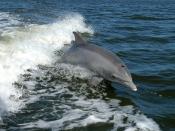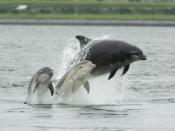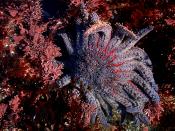Introduction
Oceans and seas cover over 70% of the world's surface, and include some of the most productive environments on the planet (Michaelis & Carocci, 2000). There are an estimated 300,000 know marine species and they represent more phyla than in terrestrial environments. Life is unevenly distributed with areas of the deep oceans relatively void of life compared to coastal regions. Species diversity is higher in coastal rather than oceanic regions, and higher in tropical regions than arctic and temerate zones (Andre, 2005). Marine environments provide a wide range of physical conditions that organisms have become highly adapted to. In coastal areas for example, many organisms are euryhaline and eurythermal withstanding the wide fluctuations of salinity and temperature in their environments. Pelagic species living in the water column are adapted for floatation The majority of species are benthic and have adapted to remain on the sea floor and sustain high pressures (CHAPTER 12, 2005; Doberski, 2005).
Adaptations to marine life across different phyla:
Phylum Chordata
Marine mammals, such as the bottlenose dolphin (Tursiops truncatus) show many adaptations to life in the water. As they originated from terrestrial environment they must come to the suface to breathe air. Adaptations for this include having a blowhole with a strong valve which opens briefly ensuring no water enters the lungs, located on the top of their heads so that they can breath whilst the rest of their body remains in the water. They give birth to precocious young that are able to swim to the surface to breath immediately and maintain homeostasis (ANON., Ocean Life; Dipper, 2005).
As water has a high viscosity and is hard to move through, dolphins have adapted a streamlined body shape, replacing the top layer of skin cells as often as every 2-4 hours helping to keep the...


